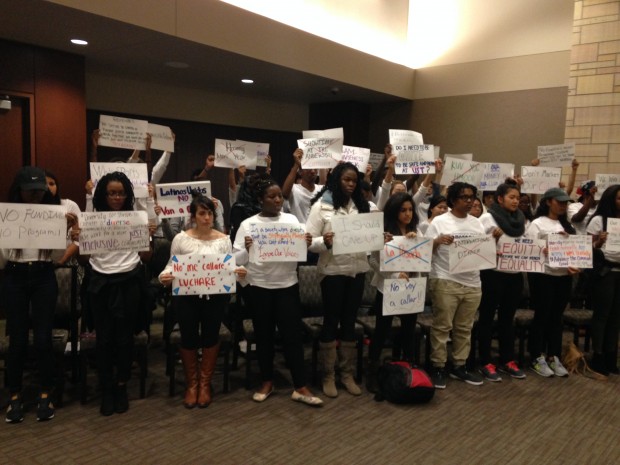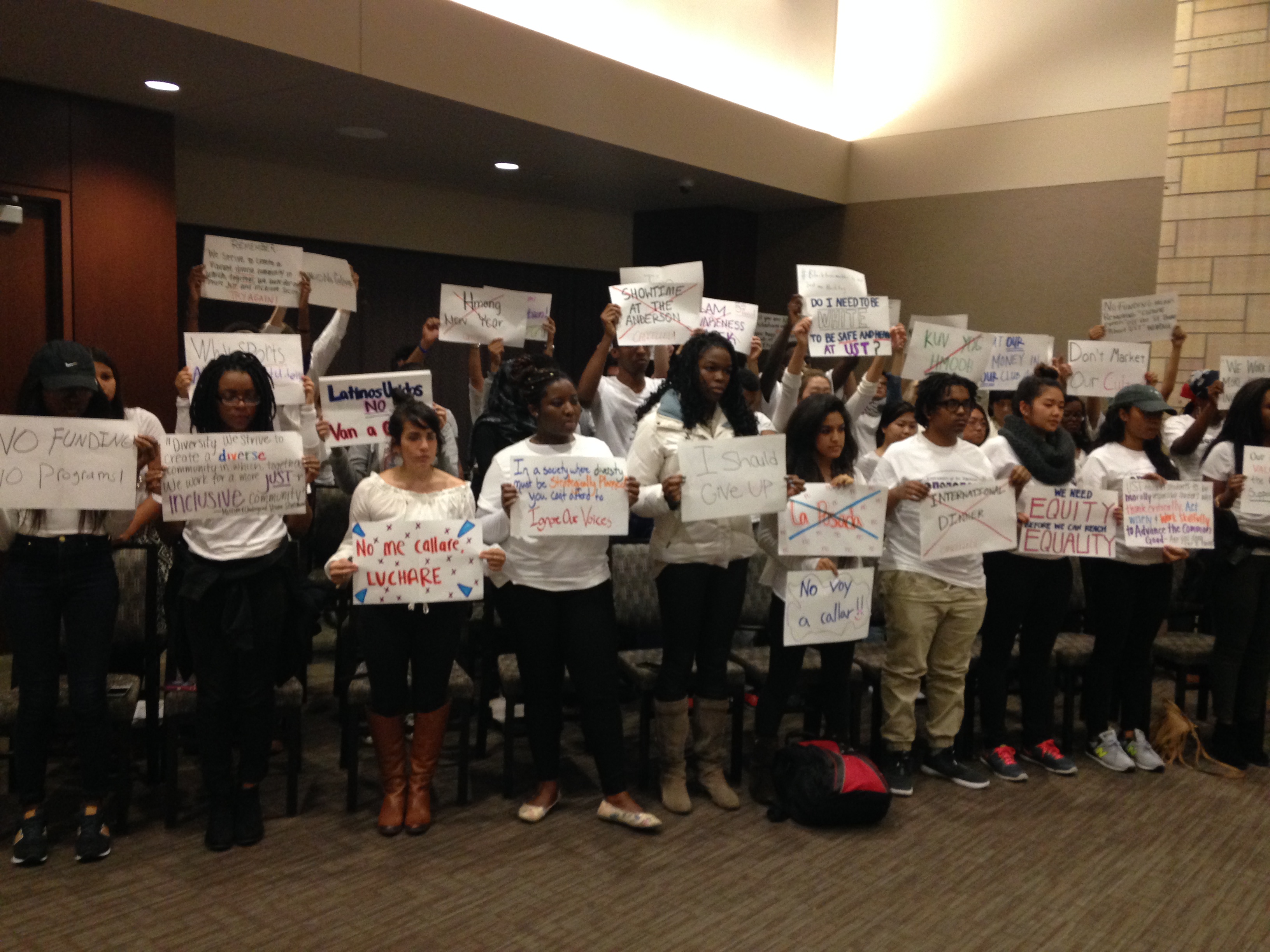
Student representatives of more than eight of St. Thomas’ multicultural clubs, as well as allies and supporters of those groups, gathered Sunday to protest Undergraduate Student Government’s decisions regarding club funding and treatment of students of color.
Gabbie Ryan, a junior and diversity representative for USG, helped organize the demonstration. Ryan said students decided to demonstrate after receiving emails from USG allocating club budgets. According to Ryan and leaders of other multicultural clubs, such as the Black Empowerment Student Alliance, the clubs received significantly less funding than asked for.
“Multicultural clubs received either half of what they asked for, a third of what they asked for or nothing at all,” Ryan said.
Abeye Cherinet, treasurer of BESA, said the club initially requested $12,950 from USG but was initially told it would receive $3,380.02. Other clubs reported similar experiences. The African Nations’ Students Association was told it would receive no funding after requesting $5,500, as was the Globally Minded Student Association, after a request for $10,290.
Keaton Beck, USG’s vice president of finance, said the lack of funding was unintentional and was due to an error made while creating club budgets. Once demonstrators wearing white T-shirts and carrying signs with messages such as, “You say you value diversity at UST…Prove it,” entered USG’s meeting, Beck spoke about the error and went over a corrected budget.
USG President Michael Gaytko said he and Keaton worked as quickly as they could to fix the budget.
“As soon as we found out about these problems, first thing (Sunday) morning, Keaton and I met for five hours today, and we resolved this as soon as we could,” he said. “As soon as these changes were noted we spent all day correcting them.”
The new budget allocated more money to multicultural clubs. BESA received $12,150; ANSA was given $5,300; and GMSA was allocated $9,590. Demonstrators said their appearance at the USG meeting was about more than just the money, however.
Raymond Kindva, USG’s international student representative, presented USG with a list of demands signed by the presidents of the African Nations’ Student Association, the Hmong United Student Association, the Globally Minded Student Association, the Saudi Club, BESA, Latinos Unidos, the Association of Latino Professionals for America and the Muslim Student Association. The list reads:
1. Transparency as to how the budget is allocated to clubs on campus and explanations as to why clubs were offered specific amounts.
2. Allocation of more funds to multicultural and social clubs on campus due to their commitments to the the strategic planning priorities of the University.
3. Students representing diverse clubs should have a seat on the Finance Committee as they are involved in the budget allocation.
4. Having Undergraduate Student Government call a meeting purposefully to hear from voices of multicultural students on campus and their concerns.
5. A seat on the executive board of USG that addresses diversity on campus.
Ryan also read a statement chastising USG for what she called its “repeated actions against the growth and continuation of the multicultural clubs on campus.”
“Our voices have been muted, and our faces tokenized for too long,” Ryan said. “Our events are not just a photo op for the university to use to attempt to convince funders, prospective students and themselves that St. Thomas values diversity.”
After Ryan read her statement, the floor was opened to student demonstrators, who expressed dissatisfaction with the treatment of students of color at St. Thomas.
“It’s not about funding; it’s about respect,” freshman Amira Warren told the gathering. Others echoed her message, saying USG members must make more of an effort to attend events hosted by multicultural clubs.
Following the demonstration Gaytko thanked the students gathered.
“We need to partner with them and make sure they no longer feel that way,” Gaytko said. “This is something that we need to hear.”
Following the meeting, Gaytko posted an apology on USG’s Facebook page that reads, in part:
“I am sorry that I have not been better at reaching out to students who need to be heard. It is my job to ensure that students have a voice and place in the undergraduate student government. I am sorry that groups on this campus feel that we have not been listening.”
Senior Natacha Eguida, president of both GMSA and ANSA, said she attended the demonstration with hopes of making St. Thomas a better place for future students of color.
“I just want to make sure that our voices are heard … and that people know that this is something that actually matters to us,” Eguida said. “I’m going to be leaving next year, so I’m here tonight not for myself – even if something changes, it’s not going to affect me – but I’m doing it for other students who are going to come here.”
Ryan said she is happy USG corrected the funding errors but still thinks more needs to be done.
“The fixed funding is very satisfactory. I think it’s a start,” she said. “But then again, even though … we do want fair funding, we want more than that; we want a voice, and we want to spark a change in this campus.”
Grace Pastoor can be reached at past6138@stthomas.edu




“You act like the whole world is against you when it’s really just you against yourself”
You’re not the only club that was denied funds friends!!!
Time to love and empower yourself instead of playing the victim.
This is really ignorant of them to do. There were so many clubs that didn’t get all the funding they asked for.. And it had nothing to do with what ethnicity they are. And if all these people don’t think they have a voice be more active on campus, join student government, etc don’t protest that doesn’t do much but seem like your complaining and whining
I think a lot of important facts were left out of this discussion. For example the discussion of what other, non-diversity related clubs receive in comparison to their request? What exactly was the “error” that was made in the allocation by USG? Did these diversity clubs reach out to USG in a mature and responsible way or did they jump straight to demonstrating? I believe the demonstration itself and their receiving more funding because of it is only rational if we have more information like this.
I was a bit confused as to why the reporter didn’t gather information from any other clubs on campus and ask them about their budgets. Did these budget mistakes happen across the board?
This article is clearly slanted to make it seem like UST and USG are racist and work to exclude various ethnic groups on campus.
Also, these groups have the same access to funds as the other groups on campus….so how exactly is their voice being silenced?
Enough with the victimization of yourselves. UST is incredibly diverse and works very hard to make it a safe and comfortable place for a person of any race or ethnicity to attend.
The club lacrosse team receives $2500 from UST every year. The team budget for the year is around $100,000. Players pay $2500 dollars every year out of pocket to play, and fundraise, to pay these dues plus equipment on top of that. We don’t feel sorry for ourselves. It’s voluntary. It’s what we pay to do something we’re passionate about. Our school is not responsible for funding every penny of student organizations. They’re voluntary. Students may have to contribute some of their own money to do what they want. A great cause doesn’t mean spoon-feeding. This isn’t an issue of racism, but a business model we’re apart of. Sometimes you have to sacrifice to do something you care about.
I was glad to read about the student protest. A protest is not just “complaining,” as JN suggests, but is a very public and strong step forward towards the changes proposed by the group. USG President recognizes this, saying “This is something we need to hear.”
Why is education so expensive? Might it be that students expect and receive funds from the school to fund their pet organizations. The same is happening out in the real world where every organization expects and many receive funding from the government, like Planned Parenthood to fund the killing of the unborn. And the costs keep rising to pay for it all. Private clubs should seek to fund themselves privately from those who agree with them and not expect general funding from everyone else. UST taxes all students to fund these clubs just as the government taxes all to fund what it chooses. Students should learn to live in the real world, because upon graduating, that’s what will happen.
I know from experience as a former student at the University of St. Thomas, member of some of these groups and even as a former executive board member for a number of years for one of these groups, that the University as attempted multiple times to either provide lower funds to these groups or have incorrectly deducted funds from their accounts. I have had to meet with the boards multiple times and show them that they had duplicated charges and even had opened more than one account and claimed that we were showing insufficient funds. They have told us that we cannot have authentic/ethnic foods and would continuously deny events even if they were cross collegiate events. The University has overall, over the years, continued to cut funding in varies ways for students of color, be it scholarships, housing, or club funding. After the University melt it’s goal with the percentage of students of color, financial and other support began to decline yet the information gathered was still used to give to funders and marketing for the purpose of reflecting continued growth and support towards diversity. There have been multiple times and ways that students have attempted discussion with varies boards at the University over the last 10+ years and each time the students have been left with being told there is nothing the University can do. They just have to deal with it or be the ones solely responsible for bringing awareness, with limits.